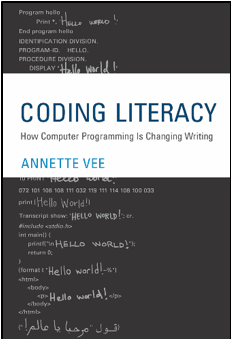Publication Details
| OLOR Series: | ROLE Reviews |
| Author(s): | Drew Virtue |
| Original Publication Date: | 15 July 2018 |
| Permalink: |
<gsole.org/olor/rolereviews/2018vol1no2.rev1> |
Publication Note
This review was originally published in Research in Online Literacy, vol. 1, no. 2 (2018).
Resource Overview
Media, Figures, Tables |
Resource Contents
Review of Coding Literacy
Coding Literacy: How Computer Programming is Changing Writing signifies a bold project in which the author, Annette Vee, works toward two ambitious goals. First, Vee uses the act of programming to illustrate how literacies are initiated, grown, and sustained as well as accepted by society. Second, she examines the history of literacy related to reading and writing as an investigative framework to question how programming has already affected and how it will continue to affect modern culture. In all honesty, I had expected something very different from what I read upon picking up this book; however, the book has provided me with new ideas and expectations when I think about what it means to code.
The book is organized around an introduction, four chapters, and a brief conclusion. The introduction, while denser than other academic works, provides a detailed overview to help contextualize the information found in later chapters. In the introduction, Vee argues that coding needs to be considered outside of a specific discipline and instead seen as a literacy. To reinforce this idea, she argues that “code and computation is not replacing writing. Instead, it has layered itself over and under our infrastructure of writing and literacy” (p. 24). This quote perfectly illustrates the muddled boundaries of code and shows the level of complexity that Vee has to contend with in making her argument.
The first chapter focuses on how literacy is understood in relation to reading and writing as well as programming. Vee analyzes literacy by exploring historical examples of literacy from seventeenth-century France up to President Obama promoting Code.org’s “Hour of Code” in 2013. The second chapter examines writing and coding as technologies and how they interact with culture. Vee shares a history of programming and how it has evolved to intermingle with writing and literacy. The third chapter looks at the historical infrastructures of writing and programming by examining the adaptation of writing in eleventh-century England compared to the growth of coding beginning in World War II. In both cases, Vee describes how these literacies were used to create an infrastructure that changed societies. The final chapter transitions from a focus on technology to how technology affects individuals who use it. These four chapters lead to a conclusion in which Vee does not provide any direct recommendations but instead stresses the need to remain critical in how we value and understand literacy as it pertains to programming.
At first, the range of ideas within this work may seem disparate. It may take a leap of faith to see the connections between eleventh-century England and Norman invaders compared to the past five years with smartphones and apps. And yet, Vee does just that. Throughout the book, she demonstrates a strong ethos through building a robust bibliography as well as developing clear arguments to reinforce her ideas. Through her writing, I have a hunch that each reader will be able to latch on to an idea(s) that feels especially relevant. I was drawn in to her discussion on the concept of literacy. Having done a bit of research on the term literacy, I have often been troubled with its slippery nature. Scholars often attempt to define “literacy” in a handful of sentences, something that I am guilty of myself, in a way that seems too simplistic for the complexity of the term. While Vee offers a one sentence definition, “a widely held, socially useful and valued set of practices with infrastructural communication technologies,” (p. 27) she also dedicates an entire chapter to contextualize the term. Perhaps the most useful ideas on literacy are when she describes it as a constant “moving target” characterized by a “rhetorical malleability” (p. 50). Within this framework, she shows how literacy is intrinsically linked to ideology—and consequently why it may be so difficult to define yet so valued by our society.
Ultimately, I believe that Vee succeeds in her two central arguments. She successfully shows the history of reading and writing and how it relates to the current progression of programming, and she offers a clear analysis of how society’s perception and valuation of literacy is changing due to the continual evolution of programming. Parts of the book may be dense, and it is difficult to discern a specific audience, but the ideas within Coding Literacy are valuable and could benefit scholars from various disciplines. And while Vee has provided a lot of answers within her work, often to questions I did not consider until reading this book, I still find myself asking new questions and wanting more—which is perhaps the best indicator of how this work has challenged and benefitted my ways of thinking about writing, coding, and literacy.
About the Reviewer
Drew Virtue is an assistant professor at Western Carolina University. His research interests examine the intersection of digital literacies, pedagogy, and issues of power and privacy. His current work measures students’ web literacy competencies and contextualizes it with what it means to be digitally literate.



